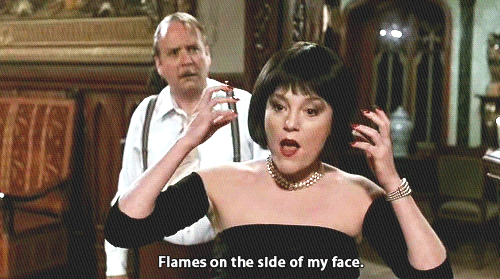
The Problem with Prologues
I make no secret of the fact that I hate prologues. I hate them so much. It’s like flames, flames on the side of my face, breathing, heaving breaths… The reason I hate prologues is that they tend to fall into one of two categories: they’re either way better than the rest of the book, or they’re boring and pointless expositions. Either way, they’re unnecessary. If the information in the prologue can’t be integrated into the rest of the book, then guess what? I probably don’t need to know it. The only thing worse than a prologue is a prologue labeled “Chapter One,” but that’s a rant for another day.
Because I hate prologues so much, I skip them. Always. The only times I bother to think about them are while pondering the psychology that makes people think prologues are a good idea. To quote BBC’s Sherlock, “Tell us from the start. DON’T be boring.” Start from the beginning is the number one rule of storytelling! So what inspires authors to include prologues in the first place? Maybe part of it is the genre they’re writing in.
Recently, my friend Colette asked me if I’d noticed that a lot of historical romance novels have prologues, “to explain why the heroine turned into a spinster, etc.” Because god knows we need that backstory. I actually hadn’t noticed, but Colette was onto something—historical novels do tend to have prologues. I even read a historical novella this year with a prologue. To repeat: A NOVELLA WITH A PROLOGUE. The mind boggles. Meanwhile, contemporary novels tend not to have prologues, especially contemporary mysteries. It used to be nearly impossible to find a YA novel with a prologue, but that doesn’t seem to be a hard and fast rule anymore.
Intrigued, I decided to some scientificish investigation into various genres, and came up with three where prologues seem to be de rigueur. I’m sure there must be reasons. Let’s take a look at what they might be by genre:
Historical Anything
From historical fiction to historical romances, prologues are often used to set the tone or orient the reader in the place and time of the novel. An author commented at Hartline Literary Agency that she uses them “to show exactly what event in my MC’s life shaped her… I wanted to create that quick sympathy in the reader for what this stoic, compassionate woman saw as a child.” You see, dear reader, first the earth cooled, and dinosaurs roamed the earth. Then amoebas evolved into humans, civilizations rose and fell, and all this leads up to the heroine being born. And then she saw something nasty. AND THEN the story starts.
Fantasy or Sci-Fi
According to Writing World, prologues in fantasy and science fiction novels are common because they provide background about a world “where the settings may differ so wildly from our own world, that without a proper explanation the reader might get lost.” Personally I’d rather be lost and wondering what the heck is going on, than bored by a bunch of lazy info dumping. Remember how the number one rule of storytelling is start at the beginning? Well rule number two is don’t bore Sherlock, and he didn’t even have to pay for this book.
Spy/Thriller
Spy and thriller prologues aren’t generally about sharing backstory or telling the reader what’s going on; they’re about capturing your attention with roundhouse kicks, car chases, and derring-do. Then Bond strolls into the office, only slightly scuffed up, and Miss Moneypenny’s like, “Here’s the next MacGuffin assignment!” These prologues are considered acceptable because they give the reader “a compelling hook that propels the reader into chapter 1,” according to one commenter at Learn to Write Fiction. I will admit that this type of prologue is not only acceptable but expected—in spy movies. Books are not movies, usually. Even if the author is deliberately trying to recall the style of those films, there’s another great place to grab the reader’s attention: CHAPTER ONE.
Prologues, love em? Hate em? Noticed any other genres that tend to have them?
_________________________
Sign up for our newsletter to have the best of Book Riot delivered straight to your inbox every two weeks. No spam. We promise.
To keep up with Book Riot on a daily basis, follow us on Twitter, like us on Facebook, , and subscribe to the Book Riot podcast in iTunes or via RSS. So much bookish goodness–all day, every day.










